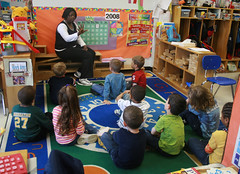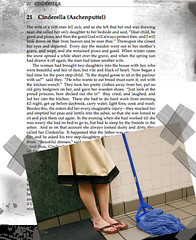Wednesday, July 23, 2008
Getting to Know You - First Days
Select this link to read a short discussion among my Personal Professional Learning network about children's literature we use to start the school journey. n2teaching thinks it is time to read Tar Beach and When the Relatives Came- Plurk.com
Two books, Tar Beach and The Relatives Came, share the common themes of family and story-telling. They engage children and fascinate adults. During the first days of school, these are the types of books you can use to encourage your students to become a family of learners with you.
Whether a child's family lives in the city or the country, these books will draw them in with a sense of awe and wonder for childhood past and present.
You can use these books to prime the pump at the well of common experience. The stories draw out each child's favorite family stories like cups of fresh water. In this way, children and teachers join each others’ common experience.
A shared experience, enhanced through storytelling, helps everyone believe in the value of the students and teacher’s common learning. It helps people make choices based on the belief in their reciprocal values. What are these reciprocal values? Even though our family groups may seem different, there are common factors between all.
Posted by
samccoy
at
Wednesday, July 23, 2008
0
comments
![]()
Labels: education, First Days, Getting To Know You, learning
Tuesday, July 22, 2008
Choices Teachers Make
The core philosophy of the PLN, Personal Learning Network, sometimes called by a variety of names like: Personal Learning Environment(PLE), Personal Learning Community (PLC), Professional Learning Network (PLN), or Professional Learning Community(PLC), remains the collaboration among your peers, professional in their field of expertise, in my case: teaching. When other people, who work to educate and inform their best practices, share their experiences and reflect on how these best practices informed their actions, they become your teacher. This is the reciprocal teaching factor that plays such an important role in effective professional development.
Relating to teachers' choices in learning to know our students and using that information to guide best practice is my focus. Children's interests in the 21st century can be boosted by all teachers and parents, not just by those with advanced resources. With that caveat in mind, this advertisement video does illustrate the point of how we can use technology as a tool to enhance learning while we get to know our students.
Today, I was reading blog posts among those from my PLN, and I was so drawn to this post, Successful Teaching: Highlighting Students’ Talents, by my colleague/friend, Pat Hensley, also known as loonyhiker, I knew I NEEDED to respond to it. This poignant story of how the teacher can validate or deny a person's ability to achieve in school based on their perceptions prompted me to make this response to Pat's thoughtful reflection of best practice as she experienced it. She reminded me that quality teaching is a choice that teachers make with help from a quality learning community.
I appreciated your reflective questions relating your experiences with your skateboard boy and the yoyo boy in the video. Children have hobbies, and frequently these hobbies are reflections of what they would want to do for work as adults. I am always concerned when these talents are dismissed out of hand.
While other teachers dismissed skateboard boy and his talents, you did not. "I would ask him why he was so good for me and not others and he looked at me and said, 'You like me and wouldn’t let me get away with any of that.' He felt the other teachers didn’t like him but he knew I cared and that made a big difference to him."
I am sure the other teachers may have thought they liked him, but as Dr. William Glasser, MD says in his classic, The Quality School Teacher:
"...we will work hard for those we care for(belonging), for those we respect and who respect us(power), for those with whom we laugh (fun), for those who allow us to think and act for ourselves (freedom), and for those who help us to make our lives secure (survival). The more that all five of these needs are satisfied in our relationship with the (teacher)manager who asks us to do the work, the harder we will work for that (teacher)manager.
Teachers also need opportunities to make appropriate choices, and they deserve principal teachers who are lead managers.
Sometimes not all teachers have the opportunity to work with those who will bring out their best, so they revert to a more coercive stance. I believe schools can be greatly helped if everyone works to make their school The Quality School I hope you don't mind that I have included a link to one of my blog posts, n2teaching: The Quality School Teacher, that relates to yours.
Thanks for this thought-provoking post that reminds me why teachers teach.
Posted by
samccoy
at
Tuesday, July 22, 2008
1 comments
![]()
Labels: Choice Theory, Dr. William Glasser, loonyhiker, n2teaching, quality, Quality Schools, students, teachers, The Quality School, The Quality School Teacher
Monday, July 7, 2008
WORDLE: Summer Time Writing Together
Some of my favorite edtech bloggers are using Wordle, to make word clouds from a text sample. The resulting visualization is great. I want to learn how to use Wordle, so I decided this was the best opportunity to begin another PLN activity. I am selecting various blog posts that are important to me, inserting the text into the Wordle generator and posting the resulting Wordle.
The Wordle in this post was created from the wonderful Day In A Sentence submissions for the July 4th week. Established by Kevin Hodgson(DogTrax), this week's Day In A Sentence was sponsored by the authors of TechnoSeeds
Posted by
samccoy
at
Monday, July 07, 2008
4
comments
![]()
Labels: blog, Day in a Sentence, DIAS, dogtrax, National Writing Project, project, technogeek, technoseeds, Wordle
Friday, July 4, 2008
A Fourth of July Retrospective
Today, I write about the excitement of the Fourth of July, when Americans celebrate the signing of the Declaration of Independence for the Eastern seaboard European colonies of America. I love to listen to patriotic music, watch movies, grill outside, make ice cream, talk to relatives and shoot fireworks. For instance, here is a trailer from one of my favorite American patriotic movies, I'm a Yankee Doodle Dandy, a biography of George M. Cohan.
Other Americans celebrate in similar ways from "sea to shining sea", and I am glad to share in their excitement. My post today is a bit of a flag waver, since my family has been in this paradoxical, yet steady love affair with the United States of America for centuries. When I talk of historical events, it is from my American perspective, so I hope you will understand. I am very thankful for my friends and colleagues all across Earth.
To many who live in countries other than the United States of America, our never-ending quest for freedom probably seems like a willow o' wisp, a hope or a goal as ephemeral as lights created from swamp gas.
In literature, Will o' the wisp sometimes has a metaphorical meaning, describing a hope or goal that leads one on but is impossible to reach,.... (Wikipedia entry for "will-o'-the-wisp"[#8])
While some of my ancestors were already here, many of my ancestors came to this continent from European countries with rules and traditions that excluded them, even killed them. For instance, one of my ancestral grandmothers, Catherine Transue Mast, was an American colonist of Huguenot ancestry. All one has to do is say the word, Huguenot, in the United States of America and most will know of their struggle. It is a shared story in our American history. These incidences happened centuries ago, and I am thankful that these Huguenot families were able to make it to what is now the United States of America.
My Huguenot ancestors survived to travel to North America and live in what is now known as Pennsylvania not just because they subscribed to the idea of freedom from "priestly kings". They believed that leaders should be elected from among their group, so people needed to be educated and involved in the socio-political affairs of the day. These ancestors believed in freedom to work for yourself and to receive pay for your own personal work.
They lived this ideal of equality among those who work for themselves, even before they helped start the American colonies. Today, they would be part of what we call the middle class. They were craftsmen, blacksmiths, farmers and teachers. They passed on such a strong devotion to the middle class that it is strongly entrenched in our familial psyche, from the moment we begin to learn.
Our family tries diligently to remain in the middle class. We believe it is the socio-economic level where most people recognize that personal choice in areas such as: work, love and honor among free individuals will always be guiding principles. I believe that our family will continue and prosper in the United States of America while there is a strong middle class ethic of freedom with responsibility to support our shared government, our democracy. Support most often means voting, paying taxes, providing guidance to our elected officials, getting an effective education and fighting together when needed.
I love the Fourth of July, and I was raised to love being an American. As Americans I will be the first to acknowledge that sometimes fall short of our ideal, but we pick up ourselves up, dust ourselves off and head for the ideal America, where freedom with responsibility prevails.
Here are some favorite songs and films. Some are stirring songs of patriotism, like the the ancestor of all American patriotic songs our national anthem, The Star Spangled Banner. Actually written by Francis Scott Key after the survival of Fort McHenry, near Baltimore, MD. The story is detailed here in this video:
This recent favorite is clearly sardonic, yet totally American. Randy Newman sings, In Defense of Our Country.
I hope I began to express the paradoxical, yet hopeful nature of my idea of modern America. Americans are trying to do their best to continue to grow as a nation and as a people.
Posted by
samccoy
at
Friday, July 04, 2008
4
comments
![]()
Labels: American History, colonies, Fourth of July, ideas, Star Spangled Banner, United States of America
Thursday, July 3, 2008
The Mind of a Teacher in Summer
This is my contribution to Keven Hodgson's project, The Day in a Sentence, from Kevin's Meandering Mind. I will post this on this week's guest host blog, TechnoSeeds, by TechnoGeek, Barbara K.
Think of summer as a time for clearing the mind of all the great ideas we have during the school year, a cleansing experience.
This refers to all the work we do over the summer to finish and release projects that have lay dormant in our minds all through the school year.
I love this project, and I hope you will agree it is a worthy effort to making writing fun.
Posted by
samccoy
at
Thursday, July 03, 2008
2
comments
![]()
Labels: Day in a Sentence, dogtrax, National Writing Project, summer, technogeek, technoseeds
Tuesday, July 1, 2008
Finally, checking out ping.fm; lol, discovered I was already a member; well, OK then.
Posted by
samccoy
at
Tuesday, July 01, 2008
0
comments
![]()

